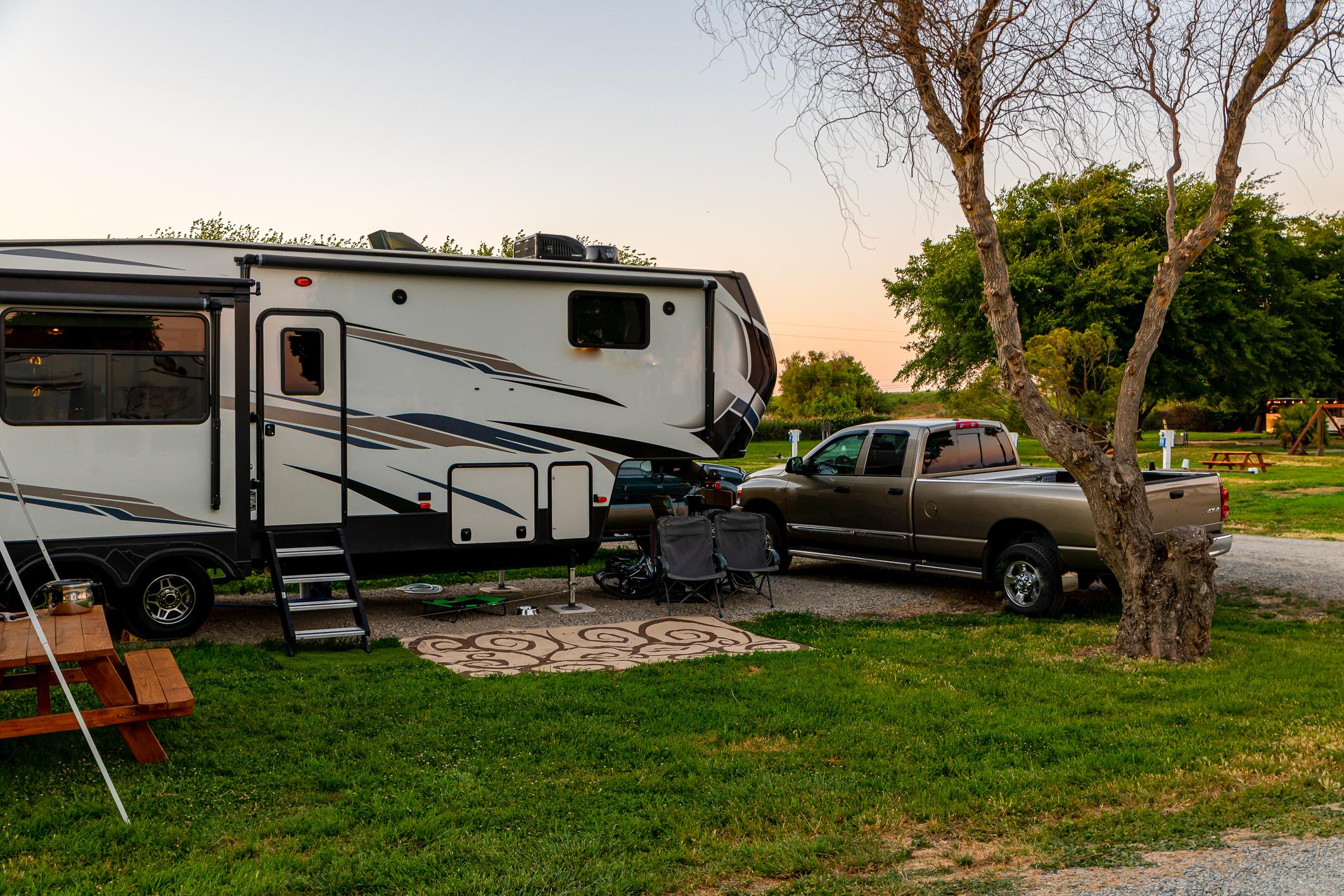
Knowing how you’ll use your RV is the best gauge for the type of RV insurance worth looking at. And if you plan on using your motorhome for most of the year — well, full time RV insurance may be right up your alley.
Full time RV insurance is designed to protect owners who use their RV either as a primary residence or who live in their RV six months out of the year. Full time insurance is similar to home insurance — it covers you for personal liability, injuries, property damage, and other losses that may happen while the RV is parked.
Living in an RV full-time means you’re exposed to certain risks that part-timers simply aren’t. if your motorhome is damaged and unlivable, you’d likely need temporary accommodations until it’s repaired or replaced. If a guest is injured in your home and sues, you might need to cover medical and legal fees. And if you live in an RV park, there are other things to think about, like HOA fees for repairs. With full time RV coverage, you’d be covered for all of those risks and more.
The difference between full time RV insurance and short-term RV insurance lies in the unique risks of living in an RV full time. If you're considering living in your RV full time, it's important to make sure you have a comprehensive RV insurance policy that includes coverages specifically crafted for full-timers. Let’s break it down.
Short-term RV insurance typically comes with basic protections, similar to an auto insurance policy. You can expect to find motorhome coverages like:
Full time RV insurance includes all the above and then some. Remember that as a full time RV owner, you’re assuming virtually all the risks of being a homeowner. That’s why full time insurance not only covers you against risks on the road but also against risks when the RV is parked. Coverage for full-timers include:
Vacation liability
Say a guest slips in your RV and sues. Or an overshot throw while tossing the pigskin smashes into a nearby camper’s window (yikes!). Personal liability can, respectively, cover medical and legal costs if you’re held liable for said guest’s injuries, and pay for that cracked window.
Personal property coverage
This coverage helps pay to replace or repair personal belongings. Plus it includes pet coverage in most states!
Scheduled medical payments
Mentioned above, medical payments coverage would help pay for an injured passenger’s hospital bills, regardless of fault. Full time coverage would extend this coverage to someone who is injured inside or around the RV while it’s parked. It helps pay for hospital fees related to stitches, ambulance rides, X-rays, and more.
Loss assessment
If you live in an RV community, there might be an HOA. Loss assessment would help reimburse you for fees an HOA would charge in order to repair damaged property in common areas.
Emergency expense coverage
If your RV is damaged to the point of being uninhabitable, this coverage can be a life-saver. It helps pay for temporary lodging while your RV is repaired or in the process of being replaced.
Adjacent structures coverage
This covers standalone structures you might have on your motorhome site. Think sheds, decks, porches, or carports.
Diminishing deductibles
This isn’t coverage so much as it is a benefit. For every consecutive year you don’t file a claim, we’ll reduce the deductible on certain coverages by a whopping 25%. A deductible is what you pay out of pocket before coverage kicks in.
Also, if you choose a higher deductible when you purchase a policy, your premium will generally be lower. If you remain claimless, your deductible will go down and your premium will remain at that lower rate.
If you rent out your motorhome or trailer on marketplaces like Outdoorsy, many RV insurers won’t cover you. Roamly will. In fact, we’re the only online, completely-digital RV insurance company who will.
You don’t have to worry about losing coverage or about convoluted, insurance-y loopholes. Additionally, with Outdoorsy’s extra rental-period insurance for verified rigs, your RV will stay covered for the duration of the rental with zero coverage gaps.
Whether it’s full-time, part-time, commercial RV insurance — or anything in between — Roamly has got you covered with quality protection at affordable rates.
Head to Roamly.com to start your free quote. We’ll ask you a few easy questions about your RV, motorhome, or trailer, and then personalize a policy based on your answers. One of our awesome US-based agents can work with you over the phone to confirm and hash out your coverage needs.
Roamly Insurance Group, LLC ("Roamly") is a licensed general agent for affiliated and non-affiliated insurance companies. Roamly is licensed as an agency in all states in which products are offered. Availability and qualification for coverage, terms, rates, and discounts may vary by jurisdiction. We do not in any way imply that the materials on the site or products are available in jurisdictions in which we are not licensed to do business or that we are soliciting business in any such jurisdiction. Coverage under your insurance policy is subject to the terms and conditions of that policy and is ultimately the decision of the buyer.
Policies provided by Roamly are underwritten by Spinnaker Insurance Company, Progressive Insurance Company, Safeco Insurance, Foremost Insurance Company, National General Insurance, Allstate Insurance Company, Mobilitas Insurance Company, Lyndon Southern Insurance Company and others.